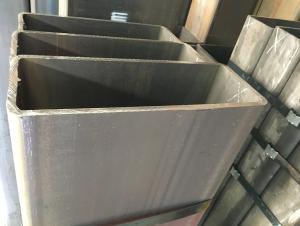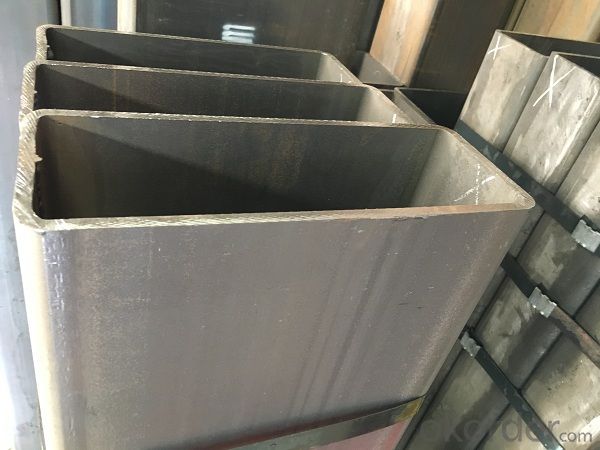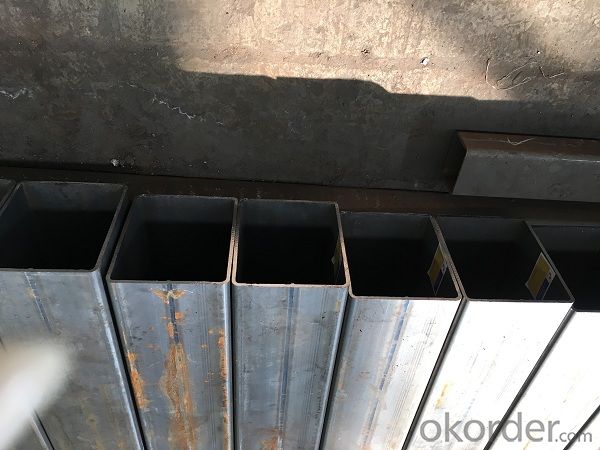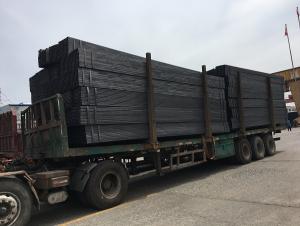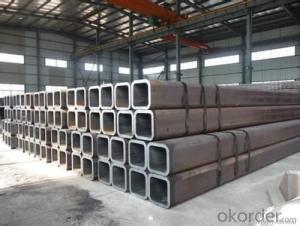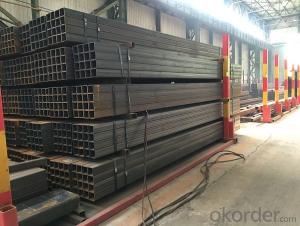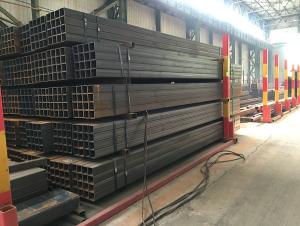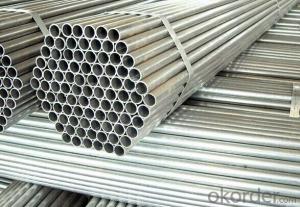Welded square rectangular tubes for structure
- Loading Port:
- Tianjin
- Payment Terms:
- TT or LC
- Min Order Qty:
- 17 m.t.
- Supply Capability:
- 13000 m.t./month
OKorder Service Pledge
OKorder Financial Service
You Might Also Like
1、 Welded square rectangular tubes for structure :
Square tube, square tube is a kind of call and rectangular tube, is equal and not equal to the length of steel pipe. Is the strip through the process of processing roll system. In general is the strip through the demolition of the package, flat, curly, welded to form a circular tube, and then rolled into a square tube and then cut into a square tube and then cut into the required length.
2、 Welded square rectangular tubes for structure
• Strong heat dissipation ability
• Good visual effect
• Reasonable price
• High manufacturing accuracy
• High strength
• Small inertia resistance
3、 Welded square rectangular tubes for structure :
Standard | GB, DIN, ASTM |
Grade | 10#-45#, 16Mn 10#, 20#, 45#, 16Mn |
Thickness | 1.5 - 25 mm |
Section Shape | Square and rectangular |
Outer Diameter | 20*20 mm-------400*400mm 20*30mm*300*500mm |
Place of Origin | Tianjin, China (Mainland) |
Length | 3-12M |
Outer Diameter | 20*20 mm-------400*400mm 20*30mm*300*500mm |
Grade | 235B 345B |
Standard | ASME, ASTM |
1) Material:(ASTM A 106/A53 GRB.API5LGRB,GB,235B,345B
2) Specification range:OD: 20*30mm----300*500mm 20*20 mm---400*400mm ,WT: 1.5 - 25 mm ,length:3-12m or according to the requirement of clients.
3) Excutive standards:GB,ASME API5L.ASTM A 106/A53,Despite of the above
4) Surface:black lacquered,varnish coating or galvanized.
5) Ends:Beveled or square cut ,painted.
6) Packing:bundles wrapped with strong steel strip,seaworthy packing.
4、Packaging & Delivery
Packaging Details: | seaworthy package,bundles wrapped with strong steel strip |
Delivery Detail: | 15-30days after received 30%TT |
5、 Welded square rectangular tubes for structure
①How is the quality of your products?
Our products are manufactured strictly according to national and internaional standard, and we take a test
on every pipe before delivered out. If you want see our quality certifications and all kinds of testing report, please just ask us for it.
Guaranteed: If products’ quality don’t accord to discription as we give or the promise before you place order, we promise 100% refund.
②How about price?
Yes, we are factory and be able to give you lowest price below market one, and we have a policy that “ for saving time and absolutely honest business attitude, we quote as lowest as possible for any customer, and discount can be given according to quantity”,if you like bargain and factory price is not low enough as you think, just don’t waste your time.Please trust the quotation we would give you, it is professional one.
③Why should you chose us?
Chose happens because of quality, then price, We can give you both.Additionally, we can also offer professional products inquiry, products knowledge train(for agents), smooth goods delivery, exellent customer solution proposals.Our service formula: good quality+good price+good service=customer’s trust
SGS test is available, customer inspection before shipping is welcome, third party inspection is no problem.
6、Seamless Pipe ASTM A106/53 Images:
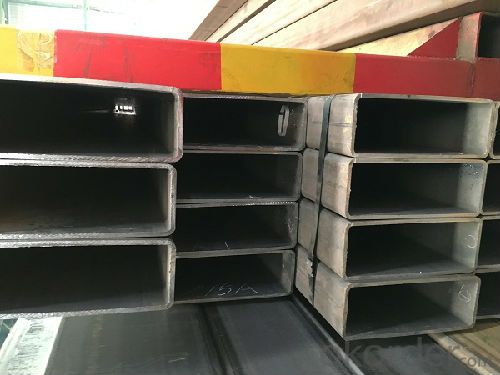
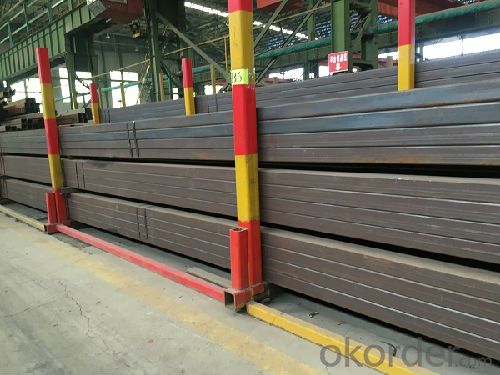
- Q: How do steel pipes handle high-pressure applications?
- Steel pipes are able to handle high-pressure applications due to their inherent strength and durability. They have a high tensile strength and are resistant to deformation under extreme pressure. Additionally, the seamless construction of steel pipes ensures that there are no weak points or joints that can compromise their ability to handle high pressures.
- Q: What are the different methods of pressure testing steel pipes?
- There are several methods of pressure testing steel pipes, including hydrostatic testing, pneumatic testing, and ultrasonic testing. Hydrostatic testing involves filling the pipe with water and applying pressure to check for leaks or weaknesses. Pneumatic testing uses compressed air or gas to pressurize the pipe and detect any leaks or failures. Ultrasonic testing utilizes high-frequency sound waves to inspect the pipe's integrity by detecting any flaws or defects.
- Q: Are steel pipes fire-resistant?
- Yes, steel pipes are generally fire-resistant. Due to their high melting point and low flammability, steel pipes can withstand high temperatures and prevent the spread of fire.
- Q: What is the difference between hot-rolled and cold-rolled steel pipes?
- Hot-rolled steel pipes are manufactured by heating the steel billets or coils to a high temperature, which allows for easier shaping and forming. The hot-rolled process also results in a rougher surface finish and larger tolerances. In contrast, cold-rolled steel pipes are made by rolling the steel at a lower temperature, resulting in a smoother surface finish, tighter tolerances, and improved strength and durability.
- Q: How long is the seamless tube?
- Seamless steel tube specification: 8-1240 * 1-200mm
- Q: What are the different types of threading on steel pipes?
- There are several types of threading commonly used on steel pipes, including tapered or NPT (National Pipe Taper), straight or NPS (National Pipe Straight), and British Standard Pipe (BSP) threading. These different types of threading are designed to ensure a secure and leak-free connection between pipes and fittings.
- Q: What are the safety precautions for handling steel pipes?
- Some safety precautions for handling steel pipes include wearing appropriate personal protective equipment such as gloves, safety glasses, and steel-toed boots. It is also important to use proper lifting techniques to prevent strain or injury, as steel pipes can be heavy. Additionally, ensuring a clear and organized workspace, as well as securing the pipes properly during transportation, can help prevent accidents or damage.
- Q: How are steel pipes used in the chemical industry?
- Steel pipes are extensively used in the chemical industry for various applications, including transportation of chemicals, gases, and liquids. They are highly durable, corrosion-resistant, and can withstand high pressure and temperature conditions. Steel pipes are used in chemical plants for the transfer of raw materials, intermediate products, and final products within the production process. They are also employed for the distribution of utilities such as water, steam, and compressed air. Additionally, steel pipes are utilized for the construction of storage tanks, reactors, and other equipment in the chemical industry due to their strength and reliability.
- Q: How are steel pipes used in the food and beverage industry?
- Steel pipes are commonly used in the food and beverage industry for various applications including transporting water, steam, gases, and other liquids. They are preferred due to their durability, strength, and resistance to corrosion, ensuring the safety and hygiene of food and beverage products. These pipes are used in processes such as conveying ingredients, transferring liquids and gases during production, and supplying utilities like water and steam for cleaning and sterilization purposes.
- Q: What is a tight steel tube?
- The tight steel tube is called "galvanized steel pipe with sleeve connection" or "flat pipe of steel metal for electrical installation". JDG. The utility model relates to a novel protective conduit for an electric circuit. The connecting sleeve and the metal accessory are provided with a wire pipeline composed of screw fastening connection technology, and the utility model does not need to do cross grounding, welding and covering, and the appearance is silvery white or yellow.
Send your message to us
Welded square rectangular tubes for structure
- Loading Port:
- Tianjin
- Payment Terms:
- TT or LC
- Min Order Qty:
- 17 m.t.
- Supply Capability:
- 13000 m.t./month
OKorder Service Pledge
OKorder Financial Service
Similar products
Hot products
Hot Searches
Related keywords
